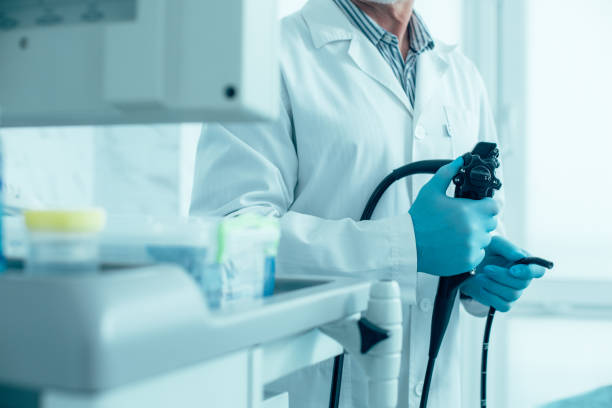Endoscopy in Nagpur
What is an Endoscopy?
Dr.Rachit Agrawal’s Endoscopy in Nagpur is a specialist hospital in treating diseases of the system (gastroenterologist) uses associate degree examination to diagnose and, sometimes, treat conditions that have an effect on the passage, abdomen and starting of the little viscus (duodenum).
An endoscope, sometimes known as a “scope,” is a medical device that is inserted into the body during endoscopy in order to observe internal organs and structures.

This process is used to look into symptoms, diagnose illnesses, and administer remedies. Depending on the goal of the treatment, the inside structures being examined, and the tools being utilised, there are numerous different types of endoscopy. A higher examination could be a procedure wont to visually examine your higher system with a small camera on the top of an extended, versatile tube.
During associate degree higher examination, associate degree medical instrument is well responded to the mouth and throat and into the passage.
Applications of endoscopy:
1. Therapeutic:-
The following therapies can be administered with endoscopic equipment:
- Hemorrhagic gastric ulcers are treated
- removal of tiny tumors or fibroids
- Taking out the stones (bladder or kidney stones, or gallstones)
- Repairing specific joint issues using arthroscopy
These are possible without requiring open surgery.
2. Diagnostic:-
This treatment is frequently used solely to visualize the tissues in particular places, which can be enough to diagnose some disorders. You can do biopsies with an endoscope to obtain smaller amounts of tissue for additional diagnostic testing.
3. Endoscopic ultrasound:-
Endoscopy and ultrasound imaging are combined for several operations. This can be utilised to assist more difficult biopsies and stone removal while providing a clearer picture of deeper internal structures.
4. Laparoscopic surgery:-
This technique, also referred to as “key-hole surgery,” entails a few tiny skin incisions through which endoscopes and adapted surgical instruments are inserted to carry out an inside procedure using the endoscopic cameras. This can, when appropriate, lower many of the hazards connected to open surgery and enhance the quality of life following a variety of surgical operations. For endoscopy in Nagpur visit to Dr. Rachit Agarwal’s clinic
Types of scope:
1. Wireless capsule endoscope:-
This alternative to a traditional endoscope was first presented in 2001 and entails ingesting a small camera, about the size of a huge tablet, which goes down the GI tract and is generally passed out of the gut. Then, it is possible to look for diagnostic clues in the video recording.
2. Conventional scope:-
An ordinary endoscope is a long, thin, flexible tube with a camera and light at one end. Depending on the endoscope’s use and whether additional biopsy or treatment is necessary, the endoscope’s structure can change.
What is the need of Endoscopy:-
PROCEDURE | TARGET | SYMPTOMS |
Upper endoscopy/gastroscopy | if necessary, the upper GI tract, which includes the esophagus, stomach, and first portion of the small intestine | swallowing issues, ongoing nausea, vomiting, or stomach pain, blood in the vomit, and unexplained weight loss |
Colonoscopy | the big bowel in the lower GI tract | unexplained weight loss, recurrent diarrhea, blood in the stools, and unexplained changes in bowel habits |
Bronchoscopy | the lungs’ air passages | persistent cough, bloody croup, and unusual chest x-ray |
How can you prepare For Endoscopy?
You should follow these procedures to ensure that you are ready for the operation before your endoscopy:
- A meal and a beverage:-
- You should refrain from eating for 6 to 8 hours prior to any surgery requiring a general anesthetic.
- You have up to two hours to consume clear liquids. This also holds true if you are undergoing any GI treatment (upper endoscopy) or bronchoscopy
- In the days before the procedure, you must refrain from eating particular foods if you are having a colonoscopy (talk to your doctor about what you need to avoid).
- In order to help the bowels empty out the day before the colonoscopy, you will also need to take a laxative.
- Medications:-
- Before undergoing an invasive treatment, be sure all of your prescriptions are in order.
- You may need to cease using any blood-thinning medications, such as warfarin or clopidogrel, a few days prior to the procedure.
- If you are having a colonoscopy, you may also need to cease taking several medications that affect bowel habits, including some types of opioids.
- Before your endoscopy, your doctor will go over any medication modifications that may be required. For best treatment in Endoscopy visit Dr. Rachit Agarwal he is providing Endoscopy treatment in Nagpur.

